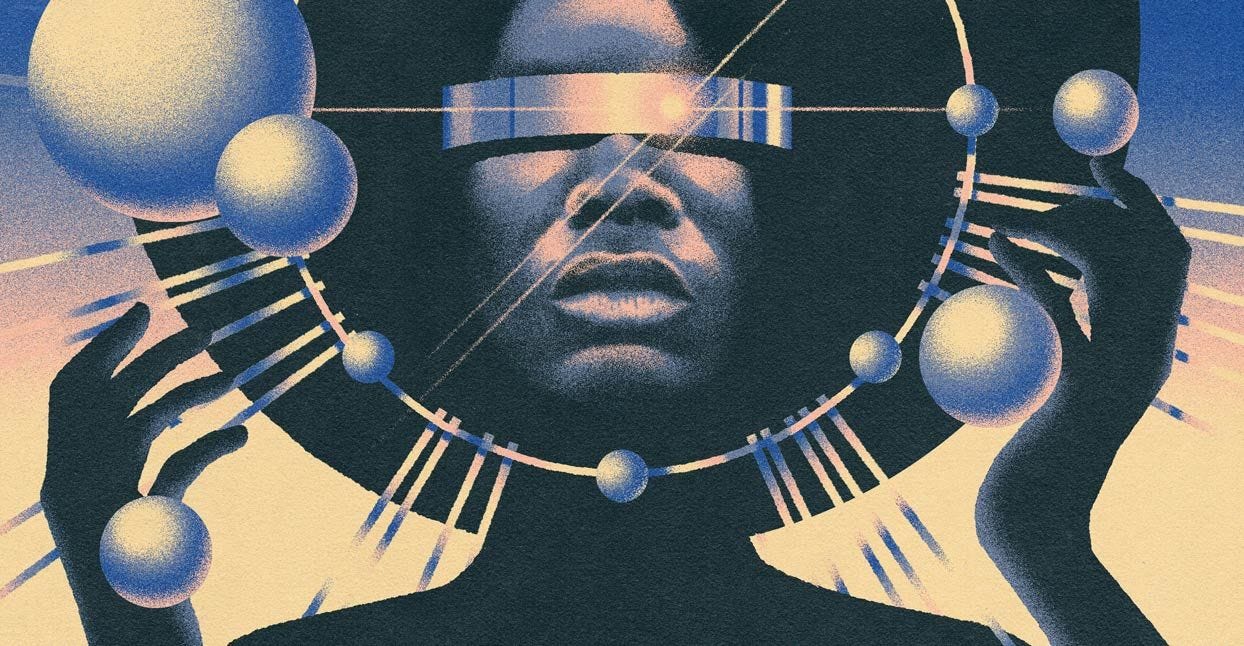My intention in writing this piece is to spark conversation around an important meta-question, propose a personal development curriculum for technologists, and connect with those who are ready to jump into the mystery of this work.
I wrote this on land that has long been stewarded by the Karuk people, who are still here.
What Makes a Humane Technologist?
It’s an important question for us to ask and never stop asking. Fortunately we already have some well refined ideas of what humane technology is: aligned with humanity’s best interests, values-centric, sensitive to human nature, narrows the gap between the powerful and the marginalized, reduces hatred and greed, helps to build shared reality, and accounts for and minimizes the externalities that it generates.
But what about the people creating the technology?
What is the anatomy of the type of person we want to trust and empower to build in this new way? What about the educators, policymakers and investors coming into the field? Who do they all need to become in order to create the world we need? How does such great transformation happen? Are there role models out there whose lives embody the essence of this collective mission?
Let’s talk about it. I want to take a stab at some answers. My qualifications: five years of experience authentically living the questions, as co-founder and CEO of the late Siempo: the first humane smartphone interface (postmortem draft here); and co-founder of Digital Wellness Collective: an industry trade association and education platform.
Key Takeaways:
• We don’t get humane technology without humane technologists.
• We need to develop curricula, pedagogy & communities of practice that empower humane technologists with the skills, awarenesses, values and experiences that are essential to create in a more life-giving way.
• The path of the humane technologist offers a high ROI in terms of richness of life.
How Are We Doing At Nurturing The Next Generation of Technologists?

It all appears to be happening. The Social Dilemma (Netflix documentary exposing damage of social media) has now been viewed by hundreds of millions of people in dozens of languages. The ecosystem around The Center for Humane Technology (nonprofit leading the charge) has grown tremendously as folks of a myriad of backgrounds have become fascinated by how we can create in a way that is aligned with the wellbeing of all life.
The fierce technological idealism that dominated the last century is starting to cool down. However despite shifting attitudes and PR speed bumps, Silicon Valley culture largely continues marching to the same beat of “move fast and break things.” Society celebrates the tech entrepreneur as the new rock star. High achieving schoolchildren are stoked about a career path that will both help them get rich AND make the biggest impact.

We have an army of young people receiving a monocultural and inhumane startup education (YC / VC / MBA), inadequate role models to meet this historical moment (Mark, Steve, Jeff, Travis, Adam, Evan etc. — and we can thank these teachers for inspiring a different way forward), and misguided motivations unleashed onto a world that is already hanging on by a thread. This is a multi-layered problem that implicates financial incentives, personal mindsets, cultural norms, and echoes of a complicated and violent history. Simply prescribing meditation may not do the trick.
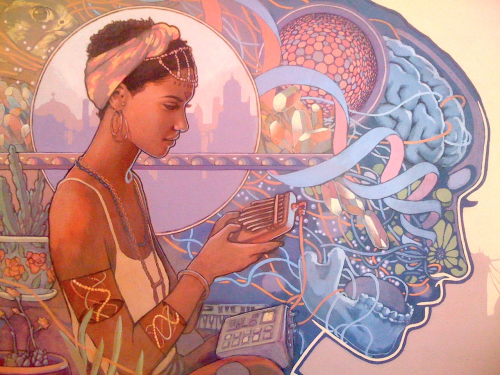
Much has been written on how to infuse tech and business with mindfulness and spirituality, or sustainability and justice. We hear calls for a more compassionate, high integrity, heart-centered technologist, through scores of books, TED talks, and retreats focused on making that one key tweak. Teach ethics to CIS students! Invest in Diversity Equity & Inclusion trainings! Try that hot new plant medicine!
Humane technology is more multidimensional than that, with no single acupuncture point capable of quickly making a person whole. YES to making many of these individual tweaks, but it’s challenging and confusing to navigate the personal growth supermarket in the dark, without a grounding context or consistent community. Pitfalls galore.
As far as I’m aware, there is no source of holistic education reaching technologists that goes the depth required to empower them to “create technology worthy of the human spirit.” No comprehensive training that would help founders and developers know themselves better and cultivate the skills to effectively contribute to a thriving future. No pedagogy that integrates the knowledge our human family has learned through time. What would that look like?

Exercise:
Let’s pretend you’re God/dess ??
Take a deep breath. Your biggest of the day ?
..
…
….
You are designing a young entrepreneur. Somebody who is going to build a new technology that influences the lives of many people.
What would you have this person study in school?
Who would you introduce as role models for them?
What initiations or challenging experiences would you have them face?
What skills would you have them learn?
What questions would you have them sit with?
(Feel free to comment directly on Medium ??)
What are the influences that ought to influence those who are gaining influence? What type of person do we want to grant such immense power to? How can we culturally regulate what gets created and how it is brought into the world?
These questions begs more attention. I’d love to continuously entertain them by crowdsourcing perspectives and creating space for conversation, so we can bubble up the educational material and tools that are most effective, accessible, and non-dogmatic. The adoption of humane tech principles is going to take time, and even if the next generation of technologists has them down, how much of a difference will it make if they are still racing towards old ideas of personal success, don’t know who they are, and lack a critical lens?
The status quo does not invite technologists to explore these questions (see: grind culture, Silicon Valley filter bubble, toxic individualism, exclusionary culture, distortions of capitalist psyche). With the majority of tech founders and investors representing a relatively homogenous life experience, of whom more than are willing to admit are consciously or unconsciously motivated by some combination of wealth / power / recognition / saving the world (I’ve been there–AMA), life on Earth is suffering profusely. Not just the environment, communities and commons. But also the wellbeing of founders themselves, their employees and their families.

What and how somebody creates is a natural expression of their life experiences, inherited stories, egoic desires, fears and unconscious biases, childhood and ancestral trauma. We face an unprecedented situation in which young people are coming into power at accelerating rates (building startups, trading crypto, becoming an influencer) and dumping the amplified waste of their limited consciousness onto the rest of us. Obtaining the power of Gods, without the love or wisdom of Gods. Traditional societies have methods for regulating this (initiation, inter-generational education), hence the African proverb:
“The child who is not embraced by the village will burn it down to feel its warmth.”
Even the most prominent of do-gooders among us are often deficient in the departments of compassion and empathy, humility and selflessness, EQ and rest, integrating diverse perspectives and finding all-win solutions. Success in the old paradigm by and large involves building certain skills at the expense of others, focusing attention here instead of there, winning at a game that we can’t afford to play any more. This comes as no surprise, given the education systems we’ve inherited. So it’s also no surprise that we continue perpetuating the same problems we seek to transcend, as we move through the world on outdated operating systems.
I don’t believe we have role model humane technologists or humane tech companies to point to and lift up today. They are aspirational archetypes, the embodiment of which require a radical slowing down, unlearning and relearning. Show me a “wellness entrepreneur” or “social entrepreneur” who really lives it. Oxymoron? This is a problem, since you can’t be what you can’t see.
And it’s also our great invitation. As the sociopolitical events of recent years highlight the dire need need to transform systems of extraction and oppression, more fingers are starting to point to the person in the mirror. Regardless of one’s background, there is a lifetime of work to do to better understand themselves and their creations in the web of life, taking those next steps on humankind’s longest journey from head to heart.
Proposing New Curricula
So what would be on the syllabus? What are the markers or badges of a humane technologist? (Let’s define as inclusive of founder, engineer, business leader, product manager, designer, even investor–anybody with meaningful influence over tech that gets built and used)
Through my challenging tenure in the Uncanny Valley and subsequently enriching experiences in the emerging humane technology field, I’ve found myself deep in inquiry around the aforementioned questions, naturally gravitating towards the societal edges and ecotones for clues, as that is where I found the cultural innovation taking place: attending gatherings of indigenous wisdom keepers, living in an East Bay activist home, supporting a metamodern political movement, attending awakening school..
With Siempo I realized I had a context and permission to really “live the mission” of creating technology that protects and promotes human flourishing. I interpreted that by doubling down on working on myself, and focusing as much on ‘the how’ of our innovation as ‘the what.’ Years of exploring and stumbling, filtering and synthesizing.
The natural evolution of that inquiry is to share some of what I’ve been exposed to with those ready to dive in. To be sure, I am a new student too, teaching what I need to learn. I couldn’t possibly have the answers. Just serving the questions here.
The goal of such a curriculum would be to provide aspiring humane technologists with an introduction to relevant domains, experiential exercises, and curated resources for deeper dives. I imagine communities of practice developing for folks to practice this new way of creating together, since we all have things to learn from each other and require accountability structures to actually do the work.
‘Success’ at the end of such a course might look like each student:
a) Articulating a long-term learning journey of their most relevant inner work to engage with
b) Creating a short-term action plan for progressing on that journey in a balanced, embodied and supported fashion
c) Making a public pledge for how they plan on showing up to this work in themselves, creations and organizations (a la North Star Ethics Pledge)
Here’s an outline of my proposed syllabus:

Please fill out this form if you are interested in engaging with or supporting a curriculum like this, or have feedback and ideas to share! I am in the process of prototyping content and experiences throughout 2021. I need help understanding and midwifing what is birthing here.
The landscape is so impossibly vast, it’s almost silly to attempt to distill into a neat package, but that’s what intro courses do. There is value in mapping and guiding. If I had a magic wand, this curriculum would be customized for the unique needs of each individual, where they are at in their journey and how they learn best. I admit my ignorance when it comes to effective teaching modalities, and welcome support as I step into this role.
This intro serves to orient the developmental journey of each person, perhaps as a complement to the domain expertise curricula of the upcoming Fundamentals of Humane Technology course, the existing Digital Wellness Certificate Program, or whatever ethical technology studies one has pursued to date. I’m not talking about throwing away the technology fundamentals, but questioning and complementing them. The yin balancing the yang.
Let’s work together to develop a great v1. In time I would love to see different versions of such a curriculum propagate across industries and geographies, types of technologist and stage of organization. All in an open source fashion. I wish to name the danger in creating another monoculture by saying one just needs to take an anti-racism course, live on a farm, study systems thinking, heal their childhood trauma and voila! Certified humane technologist, trusted and revered everywhere (although, if a technologist were to do any one of those things, it could radically change how they are able to contribute to society and our living Earth). We need a diversity of influences to inform a multiplicity of offerings.
I want to shout out the crew at JumpScale (one of the organizations I’ve worked with and now advise) for seeding some of the inspiration for a curriculum that takes an honest look at all relevant dimensions of one’s life and business. Their Good Clean Well philosophy supports the health and resilience of leaders and teams in achieving long term goals. I like to think of their work as that of a “business healer” or psychotherapist who goes in, finds where the energy is stuck, and helps move it in a way that cascades benefits to all stakeholders. I’ve come to trust them as I experience all the ways in which their leadership actually lives the mission.
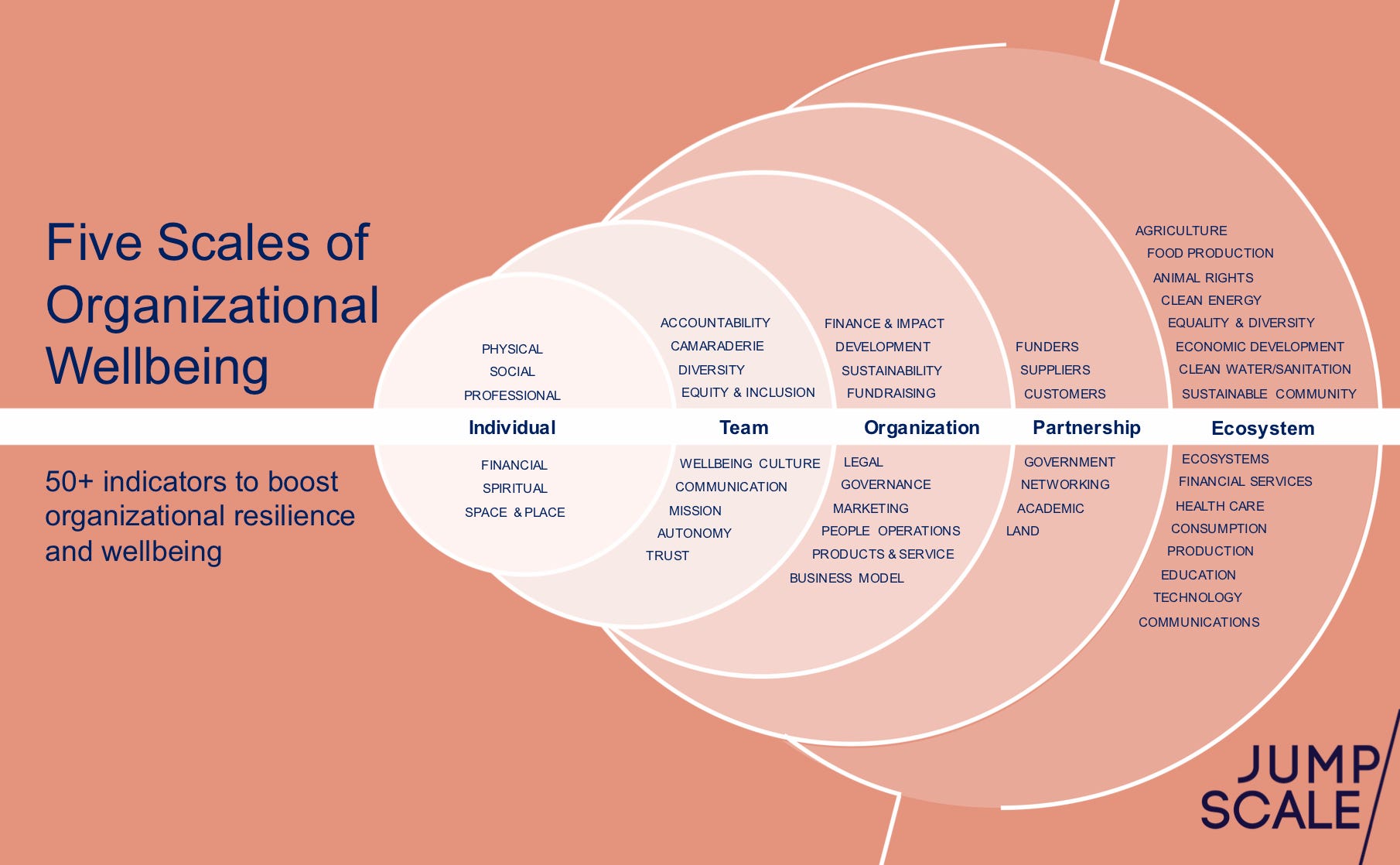
At the end of the day, we need to set the bar higher for a new generation of technologists who are more well rounded, balanced and responsible and than the average person working in tech today.
We need humane technologists who have reverence for all life, rather than just seek to profit from it.
Who know how to move slow and pay attention, rather than just move fast and break things.
Who are willing to challenge underlying assumptions, rather than just follow the conventional wisdom.
Who are in right relationship with self, other, land and whole.
The way humanity does business is radically changing before our eyes. I envision a future in which investors, employees, partners and customers demand a level of visibility into the personal development of technology founders, comparable to the records of political candidates or components of supply chains. Where a variety educational offerings exist for technologists to do their appropriate inner work in a structured, holistic and communal way. Where the path and livelihood of the humane technologist is viewed as courageous, honorable and sacred.
A New Story Of Success

This is exciting! We have a wonderful opportunity to practice and demonstrate a new way together. We have the chance to write new stories. Of what it means to be a good technologist. Of corporate accountability. Of personal and professional success. Inspiring people not out of guilt or ego, but from a higher octave vision of what Dr. Martin Luther King referred to as “Beloved Community” or Charles Eisenstein as “the more beautiful world our hearts know is possible.”
The old story about Silicon Valley success (tech and business in general) is becoming stale for many and unsustainable for all. We need a new one. That trades off personal financial gain for equitable distribution; power over for power with; isolation for interdependence. One that inspires a generation of minds and hearts to dive into this emerging field.
But how is one supposed to develop all the traditional skills required to be a sharp technologist, AND afford to learn and do all this other stuff time and money-wise?
This is a tall order. Especially if one has a family, loans, a demanding career. Which is why I think it is critical that this curriculum reaches students who have the most spaciousness to receive it. It’s also meant to be slow, long-term work. As the funding and job creation floodgates slowly begin to open, and cultural trends around what constitutes a “good life” rapidly shift, I am optimistic about cultural and financial barriers abating for those who are committed to this path, regardless of their stage in life. While acknowledging that some amount of sacrifice, risk, discomfort and creativity is often required to create things that are just and beautiful.
Supportive trends and possibilities include remote work and community living, public sector investment and favorable policy changes, UBI and debt jubilee, new cohorts of regenerative investors and a spirit of reciprocity from beneficiaries of Big Tech gains, accessibility pricing in education, excessive consumption and wealth hoarding becoming increasingly distasteful, young people dropping out of or forgoing college.
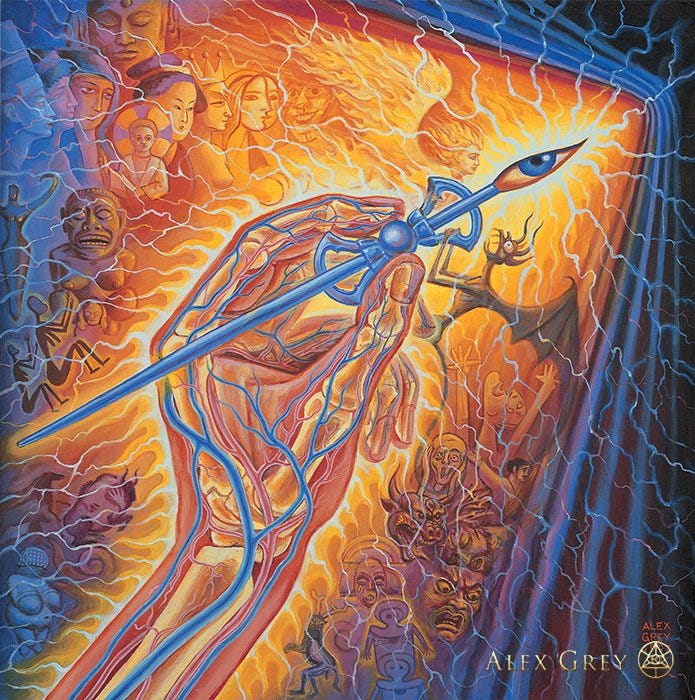
I fully acknowledge the privileges that allowed me to simultaneously work in this space early on while working on myself, and I commit to leveraging those advantages to making this material more accessible to all.
I also invite the mindset of appreciating the life educational upside of embarking on the path of the humane technologist as more risk free attention-wise (what you spend time learning will almost certainly be valuable) and high return fulfillment-wise, relative to the financial bets one makes when starting a company or joining an early stage startup solving a random problem. The tradeoffs differ in each case, but the idea is to start valuing and celebrating the extraordinary personal and professional ROI that is available across all the different types of capital we have access to: financial, social, physical, material, emotional, spiritual.
The path of the humane technologist is a beautiful one because it provides purpose, self learning, world learning, health, wisdom, community, service, maturation. It’s a context to learn about all these priceless things that make you a more complete human. What is that worth to you? What does your heart yearn for?
I’m not just talking about a sense of pride in doing the right thing. I’m talking about creating connections across lines of difference. Knowing for yourself what is true. Looking at the ugly parts of yourself that you never thought you would touch in this lifetime. Opening to the full spectrum of emotions and textures of the human experience in ineffable moments. Discovering all the ways you were made to contribute to the dance of life. Creating a dream career rich in knowledge, adventure, skills, laughter, strength, generosity, love. Beyond your wildest imagination.
I can vouch. Humane technology has been my greatest teacher. Permissioning me to enroll in a perpetual school of life. A priceless investment in self and career, community and world. And it has only just begun.
Visionary writer Octavia Butler offers:
“All that you touch, You Change.
All that you Change, Changes you.”
How much are you willing to be changed?
Next Steps
If you enjoyed this piece, please consider clapping and sharing with others in your community — whether organization, academic class, tech forum or friend group. Comment on Medium with your reflections!
I’m practicing moving slowly and not trying to thing-ify every idea that fills me with euphoria, in holding myself to a higher standard of embodying the principles I wish to convey (see more thoughts in the appendix below). This has led to a winter of several cycles of exploration and stepping away.
In this moment I feel excited about continuing to explore three things:
- Online Course. Building out the curriculum outlined above and running an online training this year for humane technologists. I am open to co-developing this with individuals and/or organizations that share a similar vision. What do you think ought to be in the syllabus?
- Community of Practice. Activating a “Regenerative Creating Circle” for a small group of idea stage founders who are ready to embark on a learning journey together in order to practice creating in a new way. This may involve cycling through some of the course material in #1.
- Individual Support. Offering personalized coaching and consulting to founders and teams. I am also available to customize retreats in Northern California (this spring) and the New York Area (summer and fall).
If any of the above piques your interest as either a student or collaborator or sponsor, please fill out this form to connect and help shape these offerings in a good way. You may also contact me at andrewmurraydunn at gmail dot com.
Thank you for your trust and attention,
?☀️ Andrew Murray Dunn
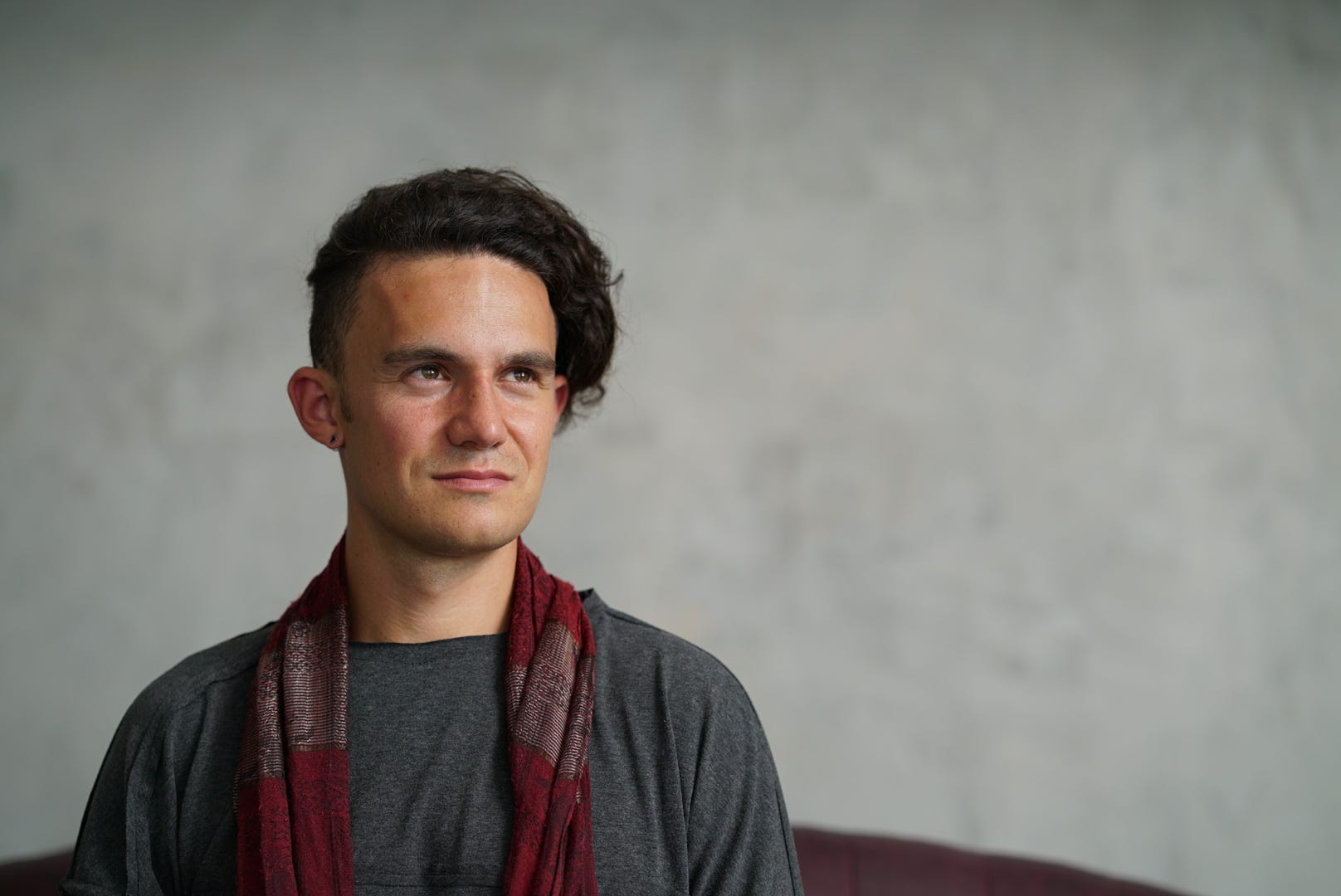
Andrew is a student and teacher at the intersection of humane technology and personal development.
Website | Email List
LinkedIn | Facebook
Twitter | Instagram
Special thanks to the following friends who have provided feedback on this piece: Belinda Liu, Gabi Jubran, AJ Goldstein, Ty Hitzeman
Appendix: Final Note on Embodiment
I’m really getting that how you do one thing is how you do everything. That how you do that thing is as important as what you do. That what you choose to work on can be a powerful teacher when you open to the lessons. That slowness and stillness down allows you to receive those lessons, see more clearly, experience the richness of life. That the medicine you need is the medicine you have to offer.
As I undergo a career transition from Messianic founder to humble educator, my #1 guide star has been to embody the essence of my message. Walk the talk. Practice what I preach.
Ha, easier said than done. I keep forgetting, slipping back from the void into grind. It’s uncomfortable; questioning deep personal mindsets, letting go of closely held stories and ways of being in the world and with the world, connecting with new levels of trust and patience, finding new rhythms that better support my nervous system. There’s a cosmic joke quality to that Siempo was all about helping people find balance, and yet I had to step away from operating it in order to discover true balance. That I know my tight cheeks and rapid heart beat are telling me to take a break from writing, and yet 9 times out of 10 I will continue to write.
I’m proud of how I’ve danced with this baby so far. In November I was excited to write a book on the topic. In December I wondered about an online course. In January I started drafting this blog post to test the concept of a course. In February it felt clear that a small community of practice was the natural next step. Now, I don’t know! Maybe it’s a combination of some of those things, or nothing at all.
Through engaging in cycles of exploration and stepping away, I feel like I’m only getting closer to the thing that I actually want to do in the next phase of my life, that embodies the essence of the medicine I need and have to offer, and that naturally fits into the needs of life on Earth, including and especially my own. Something about a doula for ideas, personalized learning journeys for humane technologists, in-person in-nature coaching, creating ritual practices and technologies to support integration and transformation..
I’m grateful for the opportunity to practice showing up to this work in a new way. Thank you for supporting me in taking those next steps.



